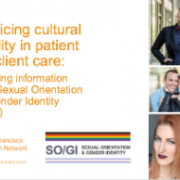Affirming Trans Access to Housing
Description:
The goal of this training module is to build better awareness, and enhance cultural humility and equitable competencies for San Francisco-focused CBOs & providers engaged in providing services and programs in homelessness response and behavioral health systems centering, prioritizing, and including Transgender, Gender Non-Confirming, Intersex (TGNCI)+, and all gender expansive communities who need and access housing services.
This training is part of the city-wide initiative of “Ending Trans Homelessness”. The principle of ending trans homelessness by 2027 means that the existing trans homeless community would be stabilized and housed over the next five years, and any future trans people that become homeless would have the resources and support to get them housed quickly, making any instance of homelessness brief and rare.
During this training, participants will learn how to build welcoming and affirming environments for TGNCI+ people, the unique needs of TGNCI+ communities who are accessing services related to housing, and review policies in place to ensure TGNCI+ populations can safely access housing services.
Trainer: HSH Equity Office & Office of Transgender Initiatives





